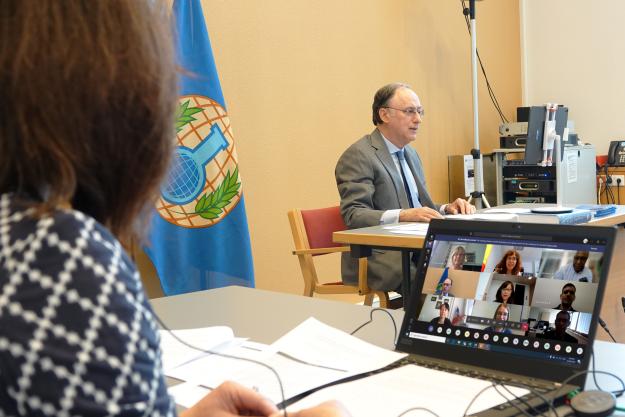
THE HAGUE, Netherlands — 3 June 2020 — The Organisation for the Prohibition of Chemical Weapons (OPCW) organised its first online workshop to enhance the analytical capacities of laboratories from OPCW Member States in Africa, and Latin America and the Caribbean (GRULAC) from 2 to 3 June 2020.
The workshop and the project are funded by the Government of the United Kingdom of Great Britain and Northern Ireland. The participants represented the following seven OPCW Member States: Brazil, Chile, Finland, Kenya, Nigeria, Spain, and the United Kingdom of Great Britain and Northern Ireland.
The workshop titled, “Assessing and Enhancing Capacity of Analytical Laboratories from African and GRULAC Member States: Toward OPCW Designation” is designed to identify and assist candidate laboratories that aspire to achieve OPCW Designated Laboratory status. The online workshop demonstrates the OPCW’s ability to adapt its programming supporting international cooperation and assistance with the use of online tools and in response to challenges posed by the COVID-19 pandemic.
H.E. Ambassador Peter Wilson, Permanent Representative of the United Kingdom of Great Britain and Northern Ireland to the OPCW, noted: “The United Kingdom of Great Britain and Northern Ireland is providing £200,000 to support this project, so that each region can have its own designated laboratory. It is vital to continue this work virtually, and this meeting demonstrates that it can be done.”
OPCW Director-General, H.E. Mr Fernando Arias, stated in his opening remarks the importance of continuing to work on initiatives to detect chemicals for control and investigation. He underlined the resilience of the OPCW in quickly adapting to these unprecedented times while continuing to deliver for OPCW Member States.
“This is the first online capacity building workshop hosted by the International Cooperation and Assistance programme. It demonstrates the OPCW’s unwavering commitment to supporting its Member States, despite the challenges imposed by the outbreak of the novel coronavirus, COVID-19,” remarked the Director-General.
The meeting discussed project progress and reviewed workplans for 2020-2021. Participants made presentations summarising their experience in the first project phase and expressed specific needs and suggestions for the future. Twenty-seven participants in total included analytical chemists and representatives of respective Member States’ National Authorities as well as officials from the OPCW Technical Secretariat.
Background
As the implementing body for the Chemical Weapons Convention, the OPCW, with its 193 Member States, oversees the global endeavour to permanently eliminate chemical weapons. Since the Convention’s entry into force in 1997, it is the most successful disarmament treaty eliminating an entire class of weapons of mass destruction.
Over 97% of all chemical weapon stockpiles declared by possessor States have been destroyed under OPCW verification. For its extensive efforts in eliminating chemical weapons, the OPCW received the 2013 Nobel Peace Prize.
The Organisation for the Prohibition of Chemical Weapons (OPCW) Designated Laboratories are a linchpin of the Organisation’s verification regime and its capacity to investigate allegations of the use of chemical weapons.
OPCW Designated Laboratories must be able to perform off-site analysis of chemical samples collected by OPCW inspectors from chemical production facilities, storage depots and other installations, or from the site of an alleged use of chemical weapons.
